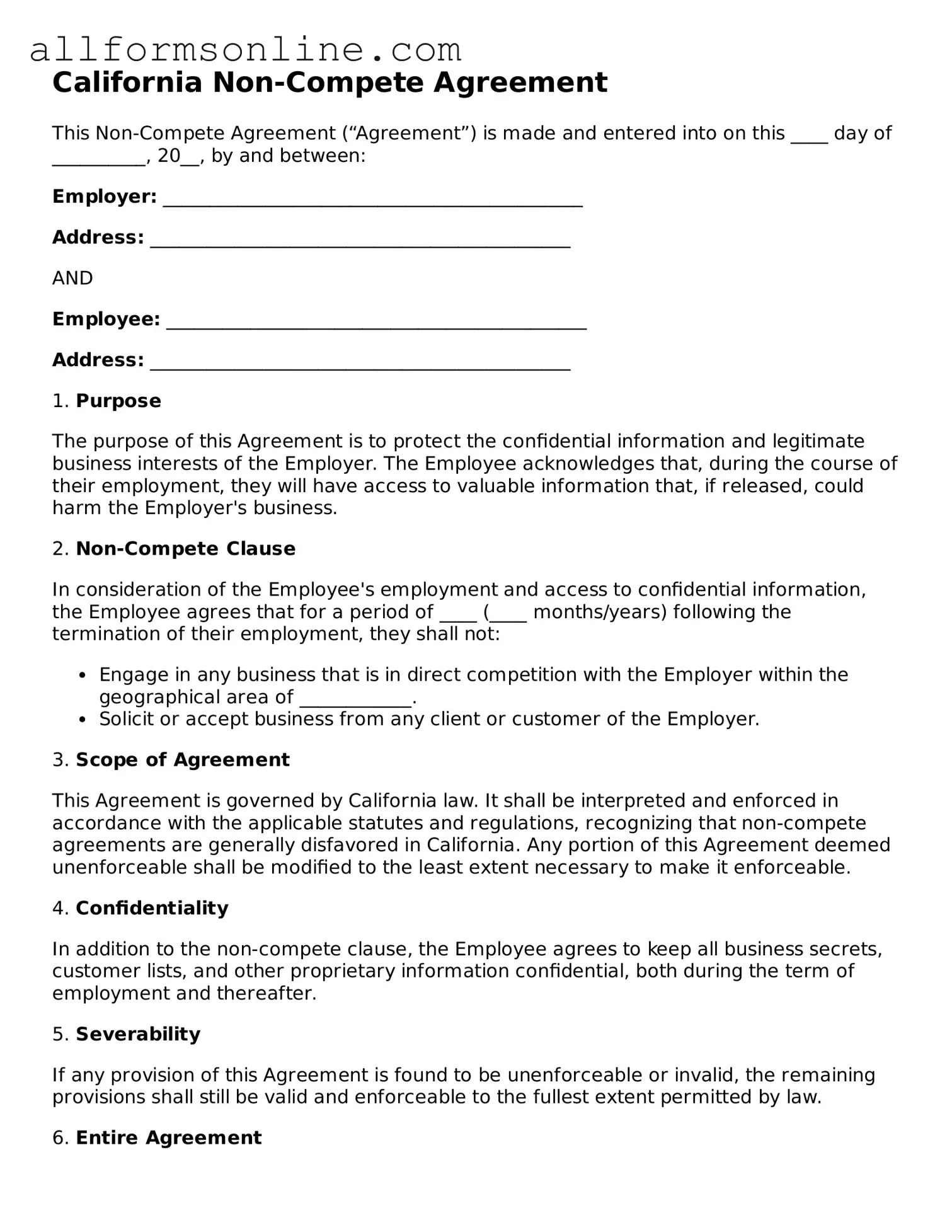Attorney-Approved Non-compete Agreement Form for California
Misconceptions
Many people hold misconceptions about the California Non-compete Agreement form. Understanding the truth behind these misconceptions can help clarify the legal landscape for employees and employers alike.
- Non-compete agreements are always enforceable in California. This is not true. California law generally prohibits non-compete agreements, making them unenforceable except in very limited circumstances.
- All employees must sign a non-compete agreement. Not all employees are required to sign these agreements. Employers may choose to implement them, but they are not mandatory under California law.
- Non-compete agreements protect trade secrets and confidential information. While this is a common belief, California law allows employers to protect their trade secrets through other means, such as confidentiality agreements, without needing a non-compete.
- Signing a non-compete agreement means I cannot work in my industry again. This is misleading. In California, even if you sign a non-compete agreement, it is unlikely to be enforced, allowing you to pursue employment in your field.
- Non-compete agreements are the same as non-solicitation agreements. These two types of agreements serve different purposes. Non-solicitation agreements restrict an employee from soliciting clients or employees, while non-compete agreements restrict employment in the same industry.
- Employers can sue employees for violating a non-compete agreement. In California, this is unlikely to succeed. Courts typically do not enforce non-compete agreements, making it difficult for employers to win such lawsuits.
- All states have the same rules regarding non-compete agreements. This is incorrect. Each state has its own laws regarding non-compete agreements. California is particularly strict, often rendering these agreements unenforceable.
Understanding these misconceptions can empower both employees and employers to navigate their rights and obligations effectively.
What to Know About This Form
What is a California Non-compete Agreement?
A California Non-compete Agreement is a contract that restricts an employee from working for a competitor or starting a competing business after leaving their current employer. However, California law generally does not enforce such agreements, making them largely ineffective in the state. This means that employees have the right to pursue their careers without being hindered by non-compete clauses.
Are Non-compete Agreements enforceable in California?
No, non-compete agreements are typically unenforceable in California. The state has strong public policy against restricting an individual's right to work. Employers cannot prevent employees from seeking employment with competitors or starting their own businesses, except in very limited circumstances, such as in the sale of a business.
What should I do if my employer asks me to sign a Non-compete Agreement?
If your employer asks you to sign a non-compete agreement, it's important to understand your rights. You may want to seek legal advice before signing. Consider discussing your concerns with your employer. They might be open to modifying the agreement or may not require it at all, given California's stance on such contracts.
Can I be sued for violating a Non-compete Agreement in California?
What are the alternatives to Non-compete Agreements?
Employers in California often use other strategies to protect their business interests. These can include non-disclosure agreements (NDAs) to protect confidential information or non-solicitation agreements that prevent former employees from soliciting clients or other employees. These alternatives can be more enforceable under California law.
What happens if I sign a Non-compete Agreement and later move to another state?
If you sign a non-compete agreement and later move to another state, the enforceability of that agreement will depend on the laws of the new state. Some states do enforce non-compete agreements, so it's important to review the specific laws where you relocate. Consulting with a legal expert in that state can provide clarity on your situation.
Other Common State-specific Non-compete Agreement Forms
Do Non Compete Agreements Hold Up in Court - The agreements can be negotiated before signing to ensure fair terms.
In order to facilitate a clear and successful vehicle sale, both buyers and sellers are encouraged to utilize the Fast PDF Templates for their California Vehicle Purchase Agreement, which will help to eliminate ambiguities and streamline the transaction process by ensuring all necessary details are documented properly.
Non Compete Agreement Florida Geographical Limitations - Employers use this form to protect their investment in employees.
Non Compete Agreement Pennsylvania - Addressing concerns about employment opportunities is essential before signing.
How to Use California Non-compete Agreement
Completing the California Non-compete Agreement form is an important step in ensuring that both parties understand their rights and obligations. After filling out the form, it should be reviewed carefully to ensure all information is accurate and complete. The next steps may involve signing the document and discussing any concerns with legal counsel if needed.
- Begin by obtaining the California Non-compete Agreement form from a reliable source.
- Fill in the name of the employer at the top of the form.
- Provide the name of the employee in the designated section.
- Clearly state the duration of the non-compete period. This is the time frame during which the employee agrees not to compete.
- Specify the geographical area where the non-compete clause applies.
- Outline the specific activities that the employee is restricted from engaging in.
- Include any exceptions or special conditions that apply to the agreement.
- Both parties should sign and date the form at the bottom.
- Make copies of the signed agreement for both the employer and employee.
